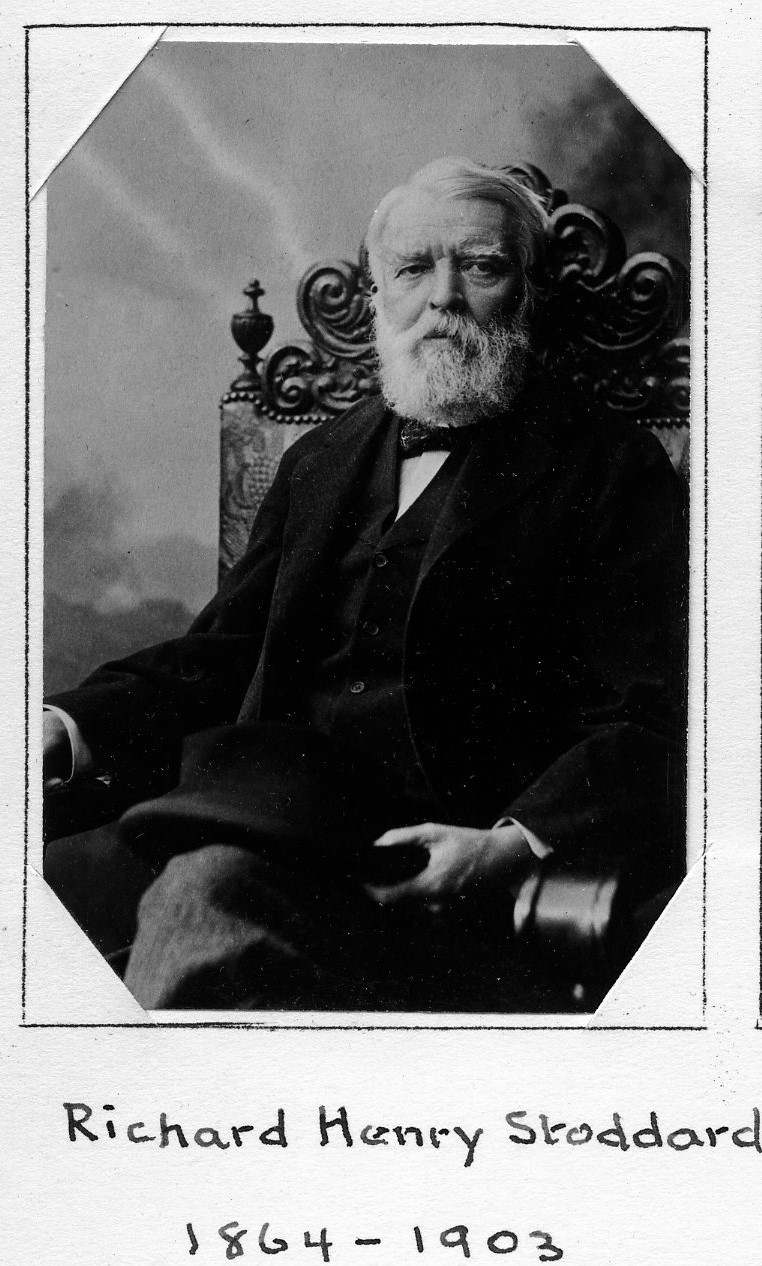Poet/Critic
Centurion, 1864–1903
Born 2 July 1825 in Hingham, Massachusetts
Died 12 May 1903 in New York (Manhattan), New York
Buried Oakland Cemetery , Sag Harbor, New York
, Sag Harbor, New York
Proposed by Louis Lang and Bayard Taylor
Elected 3 December 1864 at age thirty-nine
Archivist’s Note: Designated an honorary member in 1894. Cousin of Charles A. Stoddard
Century Memorial
It is not to Stoddard the poet, the critic, the veteran man of letters that the thoughts of the Century turn in this annual gathering. It is to the companion who linked the earliest with the latest among us, and was the delight and pride of all, the rugged, winning, keen, kindly, militant, and lovable friend. Here he lives and shall long live, not merely in the tender memory of his friends, but in those lives on which his vigorous and individual mind left its impress. He was born to friendship and dedicated to it as he was to letters. He pursued neither the one nor the other with uniform success, for he had a somewhat stormy temperament; he was prone to antipathies; his tongue was nimble and could be cruel, and he was not always careful of its sharp play. But at heart he was loyal—to himself, to his essential ideals, to his friends. It was impossible for him consciously to be unjust or ever to be ignoble. It is some years since Stoddard has been much among us, and the rich and sparkling intercourse he maintained to the last with a few intimates in his quiet and hospitable home has passed almost to the stage of tradition in the Club. Only those who have actually shared it can fully understand its opulence and its gayety, its pith and tenderness, its unflagging vitality. But these qualities have given to the tradition, as to so many built among us by gifted and generous souls, beauty and permanence.
Stoddard would have amended the term by which our members are classified and for “amateurs” would have read “lovers” of letters, his taste for a simple English word when he could find one to fit was so strong, and he was so completely himself a lover of letters. His passion was innate and he was upheld by it from childhood to old age amid many difficulties. From the day when he set himself to acquire a prose style—“I had to learn it,” he has said, “as though I were learning to write in a foreign language” —to the time when he laid down the pen that was easy master of prose and verse, his love of letters was constant, fresh, delicate, and chivalrous. He wrought after many ways, but always in the same high spirit. He scorned no toil that could bring him an honest penny, and there were long years in which the pennies were scant enough, but he never made pact with the mammon of the market, and did the slighter tasks as well as he did the greater. For many years he was the literary editor of The World, of The Mail and of The Mail and Express, successively, and his criticism was of the kind that helped both writers and readers, careful and just, sympathetic and informing. Of his poetry the friend, Mr. Stedman, whose name is habitually coupled with his in our minds, has written that it was marked by “affluence, sincere feeling, strength, a manner peculiarly his own, a very delicate fancy, and above all an imagination at times excelled by that of no other American poet,” adding that “Stoddard’s abundant songs and lyrics are always on the wing and known at first sight—a skylark brood whose notes are rich in feeling.” His Horatian ode on Abraham Lincoln is among the noblest of the verses inspired by that rare subject, and the poem on the death of Thackeray,—” “Adsum,” expresses with singular felicity his own attitude toward the great men with whom he lived for so many years in the intimacy of the mind. One likes to think of him as he described Thackeray, leaving us in the company of the Angel of Death:
“Into the night they went,
At morning, side by side,
They gained the sacred Place
Where the greatest dead abide,
Where grand old Homer sits
In godlike state benign;
Where broods in endless thought
The awful Florentine;
Where sweet Cervantes walks,
A smile on his grave face;
Where gossips quaint Montaigne,
The wisest of his race;
Where Goethe looks through all
With that calm eye of his,
Where—little seen but Light—
The only Shakespeare is!
When the new Spirit came,
They asked him, drawing near,
‘Art thou become like us?’
He answered: ‘I am here.’ ”
Edward Cary
1904 Century Association Yearbook

